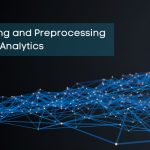Data cleaning and preprocessing are important steps in big data analytics. These processes help to ensure that the data is accurate, complete, and consistent before it can be analyzed. However, with the increasing amount of data generated every day, manual data cleaning and preprocessing can be time-consuming, expensive, and prone to errors. This is where Artificial … [Read more...] about Using AI to Automate Data Cleaning and Preprocessing for Big Data Analytics
Artificial Intelligence
Learn about the latest developments in artificial intelligence and how it is transforming industries around the world. Our website offers insights and resources for understanding AI and its applications.
The Augmented Workforce: How AI Changes the Future of Work
The below is a summary of my article on the augmented workforce. The world of work is changing rapidly, and the emerging trend of the augmented workforce is at the forefront of this transformation. This new approach integrates advanced technologies such as AI and automation with human labour, creating a more efficient and effective workforce. While there are concerns about the … [Read more...] about The Augmented Workforce: How AI Changes the Future of Work
Everything You Should Know About 3D Pose Estimation
Definition Human Pose Detection is a broadly researched topic when it comes to Deep Learning. It's mainly used to detect locations of people's joints, which form a "skeleton". Some of its applications include human action recognition, fun mobile applications, motion capture, virtual and augmented reality, sport, robotics, etc. Research on 3D Human Body Position Estimate is … [Read more...] about Everything You Should Know About 3D Pose Estimation
How to Validate OpenAI GPT Model Performance with Text Summarization (Part 1)
Regardless of your occupation or age, you've heard about OpenAI's generative pre-trained transformer (GPT) technology on LinkedIn, YouTube, or in the news. These powerful artificial intelligence models/chatbots can seemingly handle any task, from creating poems to solving leetcode problems to coherently summarizing long articles of text. GPT Playground Summarizing Jupiter … [Read more...] about How to Validate OpenAI GPT Model Performance with Text Summarization (Part 1)
Why We Need AI for Air Quality
Air pollution contributes to 7 million annual premature deaths, the rough equivalent of the population of Hong Kong. This alarming statistic has inspired many people to take action. By monitoring air quality in human settlements, researchers and citizen scientists have developed plans to help protect people against the worst effects of pollution. Problems With Air Quality … [Read more...] about Why We Need AI for Air Quality
What is artificial intelligence (AI)?
AI refers to the development of computer systems that are able to perform tasks that normally require human intelligence, such as recognizing patterns, learning from experience, and problem-solving.
AI systems can be trained to perform these tasks through the use of algorithms and machine learning techniques, which allow them to analyze and interpret data and make decisions based on that analysis. AI has the potential to significantly improve the efficiency and accuracy of many tasks, and is being applied in a wide range of industries and applications.
How is artificial intelligence used?
AI is used in a variety of industries, including healthcare, finance, retail, and transportation, to improve efficiency and productivity.
For example, in healthcare, AI can be used to analyze medical images or electronic health records to identify patterns and make diagnoses, while in finance, it can be used to identify fraudulent activity or optimize investment strategies. In retail, AI can be used to personalize customer experiences or predict demand for products.
What are some examples of artificial intelligence?
Examples of AI include self-driving cars, language translation software, and virtual assistants like Apple’s Siri or Amazon’s Alexa.
Other examples include chatbots that can handle customer service inquiries, predictive analytics tools that can forecast future outcomes, and recommendation engines that can suggest products or content based on user preferences.
What are the potential risks and benefits of artificial intelligence?
AI has the potential to revolutionize industries and improve our daily lives, but it also raises ethical concerns and the risk of job displacement. One concern is the potential for AI systems to perpetuate or amplify biases present in the data used to train them, leading to unfair or discriminatory outcomes.
There is also the risk that AI could be used to automate tasks or make decisions that have negative consequences for humans.
On the other hand, the benefits of AI include improved efficiency and accuracy, the ability to process and analyze large amounts of data quickly, and the potential to tackle complex problems that are difficult for humans to solve.
How can I learn more about artificial intelligence?
Datafloq offers a wide range of AI articles. There are many resources available for learning about AI, including online courses, books, and industry events.
Some popular online courses include those offered by Coursera, edX, and Udacity. There are also many books on AI that provide a broad overview of the field or delve into specific topics, such as machine learning or natural language processing.
Attending industry events, such as conferences or meetups, can also be a great way to learn about AI and network with others in the field. It is important to stay up-to-date on the latest developments in the field, as AI is a rapidly evolving field with many new advances and applications emerging all the time.






